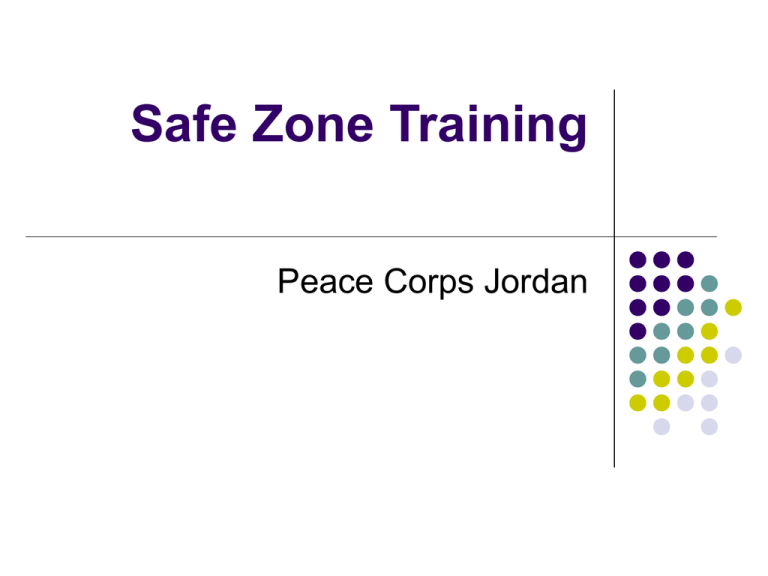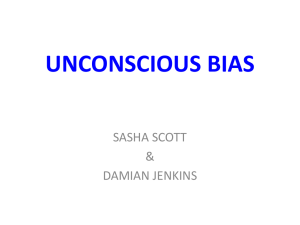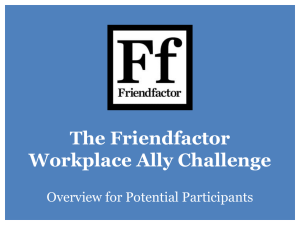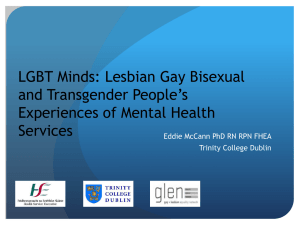
Safe Zone Training
Peace Corps Jordan
P.R.O.C.E.S.S.
Participate
Respect
Open communication
Confidentiality
Experiment with new ideas
Step forward/step back
Seek to understand
Statement of Inclusion
We won’t assume to know what your sexual
orientation or gender identity is during this
session and will never specifically ask you.
Some of you may be LGBT and others will be
heterosexual. If you are LGBT you can get
something out of this session by thinking
about your own identity development. Most
importantly, we will all begin to learn about
the ally development of your heterosexual
peers.
THIS SAFEZONE SESSION IS
FOR EVERYBODY
Problems Faced by LGBT
PCVs and PCTs
Isolation
Depression and anxiety
Fear of being “found out”
Fear of physical harm
Sexual loneliness which can lead to risk taking
Loneliness felt from larger LGBT community
Lack of trust with others
Main Goals of Safe Zone
Training
Increase PC community’s understanding and
awareness
Provide sense of safety for LGBT PCV/PCT
community
Spread belief that PC Jordan benefits from
the diversity of GLBT volunteers and trainees
Teach staff how to support PCVs and PCTs
who have LGBT related issues
WORD ASSOCIATION
LGBT VOCABULARY GAME
What is “Coming Out?”
Stages of “Coming Out”
Closeted = “I don’t want you to know”
Passing = “I assume you don’t know”
Covering = “I don’t know what you know”
Implicitly Out = “I’m gay, see it if you can”
Explicitly Out = “I’m telling you I am gay”
Publicly Out = “See me as gay”
Risks of Coming Out
Not everyone will be understanding/accepting
Family, friends, or coworkers may be shocked,
confused, or hostile
Rejection from religious community
Permanent changes in some relationships
Harassment or discrimination
Disownment from parents, loss of financial support
PC Jordan: Interrupted Service
PC Jordan: Isolation from community
Benefits of Coming Out
Ability to live honestly
Self-esteem building
Developing closer, more genuine relationships
with friends and family
Alleviating the stress of hiding one’s identity
Connecting with other people who are LGBT
Being a member of a community with whom you
have things in common
Helping to dispel myths and stereotypes by
speaking about one’s experiences
Being a role model for others
PC Jordan: Cultural exchange
How might people who are
LGBT feel about coming out to
someone?
Scared
Vulnerable
Unsure
Relieved
Proud
What might people who are
LGBT want from the people
they come out to?
Acceptance
Support
Understanding
Comfort
Reassurance
What have persons who are
LGBT been told about their
sexual orientation?
You’re just going through a phase
It’s just because you’ve never had a relationship
with someone of the opposite sex
You can’t be gay, you’ve had relationships with
people of the opposite sex
You can’t be a lesbian, you’re too pretty
You’re just depressed
You’re just confused
Maybe you can find a therapist who can help you
get over anything
Ya haram
Better things to say…
How long have you known you are LGBT?
Are you seeing anyone special?
Has it been hard for you to keep a secret?
Is there a way I can help?
Have I ever offended you unknowingly?
Why might a PCV or PCT come
out to you?
They want to have an honest and genuine
relationship with you
They may feel you are a person who will be
understanding and accepting
They are tired of putting time and energy into
hiding their identity
Some aspect of your professional relationship
makes it difficult to continue hiding their sexual
orientation
You are in a position to assist them with a
concern or address policies which impact their
life
What happens if a PCV or PCT
comes out to you?
REMEMBER!
This person has not changed!
They are the same person you knew before,
you just have more information about them
now
Remember the good and bad responses which one’s do you want to use?
REMEMBER!
Everything is amplified for PCVs/PCTs who
are LGBT here in Jordan.
SCENARIOS
What is homophobia?
The fear and/or hatred of
individuals who are LGBT and
your relationships/interactions with
them
Can be subtle/not obvious
Physical violence
Verbal assault
Vandalism
Blatant discrimination
Firing an employee
Evicting someone from their housing
Denying access to civil rights awarded to
heterosexuals
What is heterosexual privilege?
What is an “ally?”
Somebody who will confront
instances of insulting language
and stereotypes, use inclusive
language, work to educate
themselves, treat people who
are LGBT like they do
everybody else, and support
policies and laws that promote
equality
A “safe person” for someone
who is LGBT to speak with.
This means a commitment to
providing support and to
maintaining confidentiality. This
commitment extends to people
with friends and family
members that are LGBT.
How can I be an Ally while
working at PC and with PCVs
and PCTs?
Don’t assume everyone is heterosexual
Do not ever “out” someone
Don’t use anti-LGBT language
Use all inclusive language
Educate others
Interrupt prejudice
Don’t be surprised when someone comes out to
you
Respect confidentiality
Know when and where to seek help
Don’t try to guess who is LGBT
Ally Scenario Questions
You’re sitting with a group of friends, and a
couple of them make an obnoxious, bigoted
comment about gays. Do you…
(a) Ignore it
(b) Casually leave
(c) Ask them not to make such comments around
you
A friend comes up to you and tells a rumor
that a new PCT is supposedly a lesbian. Do
you…
(a) Tell them it doesn’t matter what sexual
orientation she is
(b) Ignore them
(c) Say that if she is a lesbian, let her come out on
her own terms
(d) A and C
Some of your colleagues make fun of a new
trainee because he uses stereotypically
feminine body language. Do you…
(a) Ignore it
(b) Tell them it is not funny and possibly offensive
to talk about somebody like that
(c) Join in and start making fun of the PCT too
You hear some friends discussing the
marriage equality debate happening in the
United States, when some of them state that
they think individuals who are LGBT deserve
equal rights under the law. Do you…
(a) Tell them your supportive feelings about LGBT
people
(b) Tell them you think gay people are gross
(c) Ignore it
What is difficult about these
responses?
What are the benefits of the
appropriate responses?





